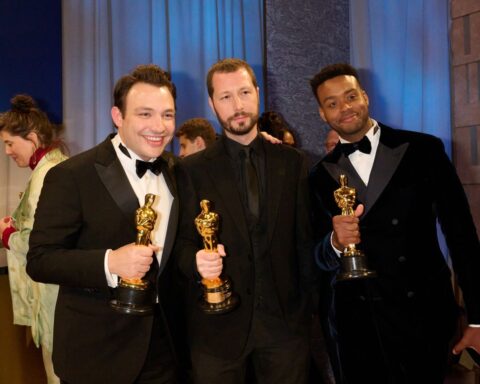carus
(USA, 121 min.)
Dir. Bryan Fogel, Writ. Bryan Fogel, Mark Monroe, Jon Bertain, Timothy Rode
Super Size Me meets Citizenfour in the mind-boggling and suspenseful doc Icarus. Bryan Fogel’s worthy Oscar nominee for Best Documentary Feature begins as a personal challenge and morphs into an international scandal. The film is an alarming whistleblower tale that raises significant concerns on the integrity of the Olympics. Following the revelations of doping by Russia’s national team, the nomination is very timely since any win in the Winter Games in Pyeongchang invites skepticism. The revelations in Icarus are so extensive, elaborate, and pervasive that nothing less than the honour of the Olympic Games is at stake.
The doc starts with Fogel putting himself through the rigorous challenge of beating the same anti-doping tests that athletes such as Lance Armstrong notoriously cheated on their way to the top of the podium. Fogel, an amateur cyclist, takes a cue from the Morgan Spurlock school of filmmaking and uses himself as an extreme case study. He undergoes the training exercises, drug injections, and urine bottling routines the professionals use to bypass the once seemingly foolproof tests. He enlists the help of Don Catlin, founder of the UCLA Olympic Analytical Laboratory, to oversee the exercise. His idea to recruit an authority on the game he’s trying to beat is ingenious and vanquishing the trials for performance enhancing drugs looks to be smooth cycling.
However, Catlin worries that the unorthodox assessment of his field of study jeopardizes his reputation, so he exits the experiment quickly. He advises Fogel to contact Grigory Rodchenkov, head of Russia’s Anti-Doping Centre, as a viable alternative. Rodchenkov is a great character and he is everything that Catlin is not, at least as far as film subjects go. He’s loud, eccentric, and boisterous compared to Catlin’s well-mannered suit. Imagine Rodchenkov as Dr. Nick, the doctor of dubious qualification from The Simpsons, lived in the flesh and ran Russia’s drug testing agency. Rodchenkov is sketchiness personified when Icarus introduces him, so naturally he agrees to participate.
Once Fogel enlists Rodchenkov’s help, his inquiry explodes into an investigation that extends further than he could have anticipated. For one, he finds noticeable improvement in his performance after frequent consultations with the doctor via Skype and several icky hormone injections into his buttocks. Moreover, Rodchenkov willingly draws upon his experience with anti-doping to assist Fogel. Rodchenkov reveals his knowledge of and participation in several schemes to thwart the very anti-doping systems he was supposed to uphold.
Fogel foresees some degree of a doping network within the sport world given the collusion of Lance Armstrong and his fellow cyclists, but once Rodchenkov becomes embroiled in allegations that Russia cheated drug tests to excel at the 2014 Sochi Olympics, the director learns that the doctor is eager to say more. While the information is revelatory for Fogel, the experience also proves eye-opening for Rodchenkov who decides to blow the whistle and come clean on the extent of Russia’s malpractice. Fogel finds himself in Laura Poitras territory as he embeds himself within Rodchenkov’s life and assists with his safe travel to the USA where he leaks detailed documents about Russia’s history of cheating the Olympics. Everything is on the table as Rodchenkov explains the complicated process of rigging the system. This operation goes back decades and allegedly reaches up the ladder to Vladimir Putin.
Icarus runs an exhausting two hours, but Fogel sustains the marathon of jaw-dropping reveals with the fury of a doc amped up on steroids. Nifty graphics help visualize Rodchenkov’s testimony as he outlines how the Russians fooled the labs by tampering with urine samples in the anti-doping lab, while the final act of the film escalates into a riveting cat and mouse game as the doctor goes into hiding. Icarus is slick and stylish in its delivery—thankfully, circumstances let Fogel do more with the whistleblower scenario than Poitras could with Citizenfour. The film explains some complicated information in detail while inserting it within the conspiratorial shroud that puts Rodchenkov’s life at risk. Narration from Rodchenkov artfully draws upon George Orwell’s concept of Big Brother as the doctor subverts the panopticon to expose the truth. The assembly of the film is as taut, seamless, and fact-checked as the report that rocks the sports world.
There are credible threats to Rodchenkov’s safety throughout the film and Icarus ends with the doctor leaving his family and entering witness protection. One can see why the steps were necessary. The implications of Icarus are clear: this systemic trickery goes beyond the Olympics. If a doctor can pull the switcheroo on a few bottles of pee in a facility, a government with devious resources and ambitions is capable of more. The resonances of the recent American election results are too strong to ignore as Fogel and Rodchenkov unpack the intricately state-sanctioned foul play. Icarus might blow the lid open on the Olympics and professional sports, but one suspects even bigger bombshells will follow.
Icarus is available to watch on Netflix.
p=.











